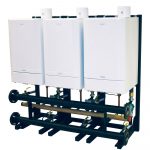The Efficiency Revolution: How Condensing Boilers Work and Why They Outshine Traditional Models
When it comes to commercial heating systems, choosing the right boiler is a critical decision for businesses aiming to maximize efficiency and minimize operational costs. In recent years, condensing boilers have emerged as a game-changer in the industry, offering unprecedented energy efficiency compared to traditional boilers like atmospheric and pressure jet types. In this article, we will explore how condensing boilers work and why they are the superior choice for commercial heating.
Understanding Condensing Boilers:
Condensing boilers are a class of high-efficiency heating equipment designed to extract more heat from the combustion process than their traditional counterparts. The key to their superior performance lies in the utilization of latent heat, a concept that traditional boilers typically waste.
-
The Combustion Process:
Condensing boilers operate much like conventional boilers when it comes to burning fuel to generate heat. Whether they use natural gas, propane, or oil, the fuel is ignited in the burner, producing a hot flame that heats water within the boiler system.
-
Condensing Heat Exchanger:
What sets condensing boilers apart is their utilization of a second heat exchanger. In addition to the primary heat exchanger, which heats the water, a secondary heat exchanger captures heat from the exhaust gases produced during combustion.
-
Cooling the Flue Gases:
Unlike traditional boilers, where hot flue gases are vented directly into the atmosphere, condensing boilers cool the flue gases to the point where they condense into water vapor. This phase change releases latent heat energy, which is then transferred to the heating system, greatly increasing efficiency.
Key Advantages of Condensing Boilers:
Now that we understand the mechanics of condensing boilers, let’s explore why they outshine traditional atmospheric and pressure jet boilers:
-
Higher Efficiency:
Condensing boilers typically achieve efficiency ratings of 90% or more, while traditional boilers often range from 70% to 85%. This translates into significant energy savings and reduced operating costs for businesses.
-
Lower Environmental Impact:
Because they burn fuel more efficiently and produce fewer greenhouse gas emissions, condensing boilers are a more environmentally friendly option, aligning with sustainability goals.
-
Energy Savings:
The increased efficiency of condensing boilers means that businesses can reduce their energy consumption, resulting in lower utility bills and a quick return on investment.
-
Compact Design:
Condensing boilers are known for their compact size and quiet operation, making them suitable for a wide range of commercial applications with space constraints.
Condensing boilers represent a remarkable advancement in commercial heating technology. By harnessing the latent heat that traditional boilers waste, they deliver higher efficiency, lower operating costs, and reduced environmental impact. For businesses seeking an energy-efficient and cost-effective heating solution, condensing boilers are the clear choice, surpassing traditional atmospheric and pressure jet boilers in every aspect of performance. Consider upgrading to a condensing boiler to enjoy the benefits of a more sustainable and efficient heating system.





